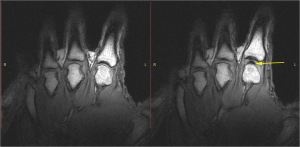You’ve been there before. You are sitting or standing around and get a mental sensation that you need to “pop your knuckles”. A swift squeeze of your fingers and the tension is relieved. Crisis averted. But why do knuckles make that popping sound when you crack them? If questions like this keep you up at night… maybe you need to reevaluate your priorities. But, if the start of this article has piqued your interest, you will be pleased to know that a a team of researchers, led by the University of Alberta Faculty of Rehabilitation Medicine, have confirmed the reasons for knuckle popping.

The metocarpophaangeal (MCP) joint of interest centred over the bore of the radiofrequency coil (middle). The participant’s hand within the imaging magnet (right). (Photo credit: Kawchuck et al. 2015, PLoS ONE)
How? SCIENCE! But more specifically, in a “pull my finger study,” by placing a test subject’s hands inside an MRI machine, pulling the test subject’s fingers, and recording the results. What they found was that vacuum cavities (aka bubbles) formed in the synovial fluid of the joint, and the formation of these bubbles caused the popping noise we associated with cracking our knuckles. Cool!

The same hand following cracking with the addition of a post-cracking distraction force (right). Note the dark, interarticular void (Photo credit: Kawchuck et al. 2015, PLoS ONE)
The theory of bubbles in the joints of a knuckles was first developed in the late 1940s by researchers in the U.K. who hypothesized that cracking the knuckles caused bubbles to form in the synovial fluid causing a popping noise. However, a few decades later another study suggested that it was not the formation of the bubbles but their collapse (i.e. bubble bursting) that produced the audible popping noise. Ugh Science, you can be so ambiguous sometimes?
Lucky for us Kawchuck and his team have definitively proven that it is the formation of the bubbles that produces the noise, and not their collapse. So the next time you see someone cracking their knuckles, instead of scaring them with tells of arthritis, you can wow them with anatomical descriptions of why they make that noise. #nerdout
A really cool video of this work can be viewed here. And you can read the full study published in the journal PLoS ONE.
Happy FSF!